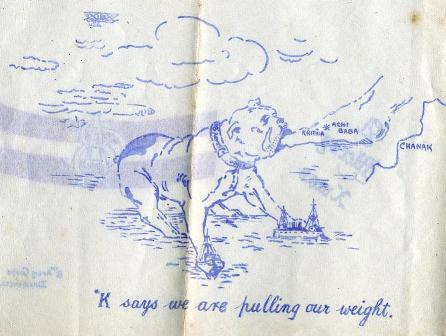26 December 1915
HELLES - If it was not clear to most of the British troops at Helles on December 26, it would soon be. Preparations were being made for the final evacuation using the same successful tactics that made the withdrawal from Anzac and Suvla such a success. Before then though, there was a distinct increase in Turkish shelling, a sign in its own right that hanging on to Helles would become quickly untenable.
 Drawing: A section from the VIII Corps Christmas card for 1915, titled "If you think we're down 'earted - we a'int"
Drawing: A section from the VIII Corps Christmas card for 1915, titled "If you think we're down 'earted - we a'int"
"The Turks bombarded the whole line from the Aegean to the Straits from dawn to late evening. They seem to have plenty of ammunition; this is the fourth successive day of systematic shelling, shrapnel and high explosives that leave a heavy pall of black smoke after their deafening crash. Out own artillery seems to have given the few shells they possessed to the Turks; only an occasioned squib goes over in reply to the hundreds of Turkish coal boxes.
Upon entering the support lines on our way to the gallery tonight we were instructed in a subdued whisper to wrap our feet with sandbags and not make the lightest sound, with no talking and no smoking. I could not understand what was going on. It was going to be very awkward to dig without making any noise. I cogitated on this on my way through the tunnel to the firing line in the Gully. I had not noticed anyone asleep so why all this hush-hush nonsense?
When we reached the gallery we were told that as from yesterday there was to be a ‘silent period’ each night, the time and duration of these periods being altered nightly. As these times everyone in the firing line would have his feet swathed in sandbags to muffle his footfalls; all equipment that might jangle had to be discarded; there was to be no talking or smoking; no Very Lights were to be fired and there was to be no rifle fire. The Turkish patrols were to be ignored unless they came within our wire.
These spells of silence were uncanny and yet we were allowed to continue digging. I had the feeling the whole world was listening to the noise of my digging. We are almost directly underneath the Turkish redoubt and they cannot help hearing us, which seems to make utter nonsense of the whole idea. Tonight’s period was of two hours’ duration. Even the working party carried out the filled sandbags in silence. The air was much cleaner as the no-talking ban also included swearing. There is nothing like a good swear word to make things go the way you want them and the work suffered accordingly. Trying to be a choir-boy when you are a trooper is very difficult, to say the least. When the silence period was over the working party gave vent to their feelings with added stress when they bumped their heads in the dark, as they often did. The air returned to normal." (Ordinary Seaman Joseph Murray, Hood Battalion, 2nd Brigade, RND attached to VIII Corps Mining Engineers)
SOURCE:
J. Murray, “Gallipoli As I Saw It” (William Kimber: London 1965), pp. 180-181.
